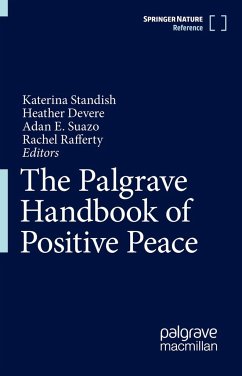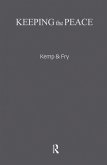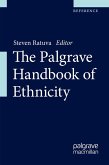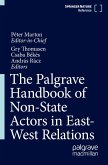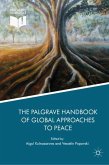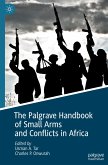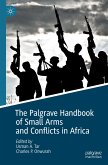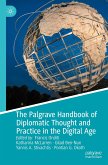The Palgrave Handbook of Positive Peace
Herausgeber: Standish, Katerina; Rafferty, Rachel; Suazo, Adan; Devere, Heather
The Palgrave Handbook of Positive Peace
Herausgeber: Standish, Katerina; Rafferty, Rachel; Suazo, Adan; Devere, Heather
- Gebundenes Buch
- Merkliste
- Auf die Merkliste
- Bewerten Bewerten
- Teilen
- Produkt teilen
- Produkterinnerung
- Produkterinnerung
This Handbook represents an unprecedented exploration of the positive peace platform. It permits a comprehensive appreciation of the breadth of positive peace that engages with nonviolence, environmental sustainability, social justice and positive relationships scholarship. The work serves as a one-stop shop for scholar/practitioners interested in locating their inquiry and outputs in the field of positive peace and provides readers from a multitude of disciplines and academic departments with a comprehensive overview of the multiplicity of positive peace research in one location. In doing so,…mehr
Andere Kunden interessierten sich auch für
![Keeping the Peace Keeping the Peace]() Douglas P. Fry (ed.)Keeping the Peace198,99 €
Douglas P. Fry (ed.)Keeping the Peace198,99 €![The Palgrave Handbook of Ethnicity The Palgrave Handbook of Ethnicity]() The Palgrave Handbook of Ethnicity653,99 €
The Palgrave Handbook of Ethnicity653,99 €![The Palgrave Handbook of Non-State Actors in East-West Relations The Palgrave Handbook of Non-State Actors in East-West Relations]() The Palgrave Handbook of Non-State Actors in East-West Relations335,99 €
The Palgrave Handbook of Non-State Actors in East-West Relations335,99 €![The Palgrave Handbook of Global Approaches to Peace The Palgrave Handbook of Global Approaches to Peace]() The Palgrave Handbook of Global Approaches to Peace194,99 €
The Palgrave Handbook of Global Approaches to Peace194,99 €![The Palgrave Handbook of Small Arms and Conflicts in Africa The Palgrave Handbook of Small Arms and Conflicts in Africa]() The Palgrave Handbook of Small Arms and Conflicts in Africa169,99 €
The Palgrave Handbook of Small Arms and Conflicts in Africa169,99 €![The Palgrave Handbook of Small Arms and Conflicts in Africa The Palgrave Handbook of Small Arms and Conflicts in Africa]() The Palgrave Handbook of Small Arms and Conflicts in Africa177,99 €
The Palgrave Handbook of Small Arms and Conflicts in Africa177,99 €![The Palgrave Handbook of Diplomatic Thought and Practice in the Digital Age The Palgrave Handbook of Diplomatic Thought and Practice in the Digital Age]() The Palgrave Handbook of Diplomatic Thought and Practice in the Digital Age177,99 €
The Palgrave Handbook of Diplomatic Thought and Practice in the Digital Age177,99 €-
-
-
This Handbook represents an unprecedented exploration of the positive peace platform. It permits a comprehensive appreciation of the breadth of positive peace that engages with nonviolence, environmental sustainability, social justice and positive relationships scholarship. The work serves as a one-stop shop for scholar/practitioners interested in locating their inquiry and outputs in the field of positive peace and provides readers from a multitude of disciplines and academic departments with a comprehensive overview of the multiplicity of positive peace research in one location. In doing so, the Handbook of Positive Peace securely demarcates and recognizes the positive peace platform in social scientific and humanities academic disciplines.
Hinweis: Dieser Artikel kann nur an eine deutsche Lieferadresse ausgeliefert werden.
Hinweis: Dieser Artikel kann nur an eine deutsche Lieferadresse ausgeliefert werden.
Produktdetails
- Produktdetails
- Verlag: Springer / Springer Singapore
- 2022 edition
- Seitenzahl: 1200
- Erscheinungstermin: 13. Februar 2022
- Englisch
- Abmessung: 239mm x 160mm x 69mm
- Gewicht: 2631g
- ISBN-13: 9789811609688
- ISBN-10: 9811609683
- Artikelnr.: 61189916
- Herstellerkennzeichnung
- Libri GmbH
- Europaallee 1
- 36244 Bad Hersfeld
- gpsr@libri.de
- Verlag: Springer / Springer Singapore
- 2022 edition
- Seitenzahl: 1200
- Erscheinungstermin: 13. Februar 2022
- Englisch
- Abmessung: 239mm x 160mm x 69mm
- Gewicht: 2631g
- ISBN-13: 9789811609688
- ISBN-10: 9811609683
- Artikelnr.: 61189916
- Herstellerkennzeichnung
- Libri GmbH
- Europaallee 1
- 36244 Bad Hersfeld
- gpsr@libri.de
Dr Katerina Standish is the Director of Research and Senior Lecturer at the National Centre for Peace and Conflict Studies at the University of Otago, New Zealand. Her research projects and scholarly publications include content related to COVID-19, suicide, femicide, conflict transformation, decolonization, story, humanistic sociology, hope, gender, social, cultural and political violence, Encounter Theory, education and conflict, peace education, Human Rights, social justice, personal peacebuilding, principled/pragmatic nonviolence and academic research and writing. She is the author, co-author or co-editor of Suicide Through a Peacebuilding lens, Yogic Peace Education, Cultural Violence in the Classroom, Conflict Transformation, Peacebuilding and Storytelling, and Expanding the Edges of Narrative Enquiry: Research from the Mauro Institute. Dr Standish has published academic journal articles in Peace Review, Peacebuilding, Journal of Peace Education, Journal of Peace and Justice Studies, In Factis Pax: Journal of Peace Education and Justice Studies, Peace and Conflict Studies Journal, Peace Research: The Canadian Journal of Peace and Conflict Studies, Humanity & Society, Journal of Gender Studies, Diaspora, Indigenous, and Minority Education, Nationalism and Ethnic Politics, Nordic Journal of Studies in Educational Policy, Global Journal of Peace Research and Praxis, Peace Studies Journal, Peace and Conflict Review, International Journal of Development Education & Global Learning, Journal of Intervention and Statebuilding, Journal of Human Security and Geopolitics. Dr Standish is the Editor-in-Chief of the Peace Review: A Journal of Social Justice, senior editor of the Palgrave Handbook for Positive Peace, and sits on the editorial boards of the Journal of Peace Education, In Factis Pax: Journal of Peace Education and Social Justice, InternationalJournal of Advanced Peace and Gandhian Studies, and Global Journal of Peace Research and Praxis. Dr Standish is a community peacebuilder, Certified Conflict Coach, Somatic Trainer and trauma informed instructor. Dr Adan E. Suazo is a Senior Policy Analyst at the Ministry for the Environment (New Zealand) and a Research Associate at the National Centre for Peace and Conflict Studies at the University of Otago (New Zealand). His research examines the conditions that influence the emergence and intensification of water disputes. He also specialises in the design and implementation of stakeholder identification and engagement strategies for peacebuilding and policy development. As the founding Coordinator of the Loyola Sustainability Research Centre at Concordia University (Canada), he worked on sustainability and peacebuilding projects with the International Secretariat for the Convention on Biological Diversity, the United Nations Environmental Education and Training Unit, and Future Earth. Dr Heather Devere is Director of Practice at the Te Ao o Rongomaraeroa/National Centre for Peace and Conflict Studies at the University of Otago in Aotearoa New Zealand. Her doctoral thesis is in Politics from the University of Auckland and examines women's attitudes to civil rights issues. She has taught at several universities on topics such as conflict resolution, indigenous peace traditions, ethics, social justice, and politics, and acts as an advocate for mediations involving not-for-profit organisations. Dr Devere is founding co-editor of AMITY: The Journal of Friendship Studies published by Leeds University. Some of Dr Devere's publications include Friendship Studies: Practices across Cultures (with Dr Graham Smith and Professor John von Heyking); Decolonising Peace and Conflict Studies through Indigenous Research (with Dr Kelli Te Maih¿roa and Dr Michael Ligaliga); Peacebuilding and the Rights of the Indigenous Peoples (with Dr John Synott and Dr Kelli Te Maih¿roa) and The Challenge to Friendship Studies in Modernity (with Professor Preston King). Dr Rachel Rafferty Dr Rachel Rafferty works as a Lecturer in Sociology at the University of Derby, United Kingdom. Before joining the University of Derby, she worked as a Lecturer in Peace and Conflict Studies at the National Centre for Peace and Conflict Studies at the University of Otago, Aotearoa New Zealand. Before Dr Rafferty moved into an academic career, she gained several years of work experience in the charity sector. She worked for over five years coordinating community peacebuilding projects in post-conflict Northern Ireland. This work involved activities such as facilitating dialogues between different religious groups, coordinating collaborative art projects, and working with schools to promote peace education. She has also previously worked with New Zealand Red Cross coordinating youth humanitarian projects. Dr Rafferty's areas of expertise include collective memory in ethnic conflicts, peace activism, and refugee resettlement. She has published a number of journal articles and book chapters on topics such as post-conflict peacebuilding, international conflict resolution, and refugee resettlement. Dr Rafferty holds a PhD in Peace and Conflict Studies from the University of Otago.
1. Defining the Platform of Positive Peace.
2. The Nature of Reflective Choice and Nonviolence as a Personal Practice of Yoga.
3. Personal Peacebuilding and COVID
19.
4. Humor as a Major Intellectual Device for Thriving in Complexity.
5. Contemplative Practices and Nonviolence.
6. Resilience and the Claiming of Voice by Marginalized Communities.
7. True Colors: Nonviolent Communication in the Post
Colonial Workplace.
8. Forgiveness: A Nonviolent Resolution of Interpersonal Conflict.
9. Peace Education.
10. Classroom Resistance: Peace Education in a Time of Rising Authoritarianism.
11. Nonviolent Resistance, Social Justice and Positive Peace.
12. Pragmatic Nonviolence and Positive Peace.
13. Women in Environmental Nonviolent Action.
14. Satire and the Public Sphere: Ethics and Poetics, Reverse Discourses, Satiractivism. 15. Unarmed Civilian Peacekeeping.
2. The Nature of Reflective Choice and Nonviolence as a Personal Practice of Yoga.
3. Personal Peacebuilding and COVID
19.
4. Humor as a Major Intellectual Device for Thriving in Complexity.
5. Contemplative Practices and Nonviolence.
6. Resilience and the Claiming of Voice by Marginalized Communities.
7. True Colors: Nonviolent Communication in the Post
Colonial Workplace.
8. Forgiveness: A Nonviolent Resolution of Interpersonal Conflict.
9. Peace Education.
10. Classroom Resistance: Peace Education in a Time of Rising Authoritarianism.
11. Nonviolent Resistance, Social Justice and Positive Peace.
12. Pragmatic Nonviolence and Positive Peace.
13. Women in Environmental Nonviolent Action.
14. Satire and the Public Sphere: Ethics and Poetics, Reverse Discourses, Satiractivism. 15. Unarmed Civilian Peacekeeping.
1. Defining the Platform of Positive Peace.
2. The Nature of Reflective Choice and Nonviolence as a Personal Practice of Yoga.
3. Personal Peacebuilding and COVID
19.
4. Humor as a Major Intellectual Device for Thriving in Complexity.
5. Contemplative Practices and Nonviolence.
6. Resilience and the Claiming of Voice by Marginalized Communities.
7. True Colors: Nonviolent Communication in the Post
Colonial Workplace.
8. Forgiveness: A Nonviolent Resolution of Interpersonal Conflict.
9. Peace Education.
10. Classroom Resistance: Peace Education in a Time of Rising Authoritarianism.
11. Nonviolent Resistance, Social Justice and Positive Peace.
12. Pragmatic Nonviolence and Positive Peace.
13. Women in Environmental Nonviolent Action.
14. Satire and the Public Sphere: Ethics and Poetics, Reverse Discourses, Satiractivism. 15. Unarmed Civilian Peacekeeping.
2. The Nature of Reflective Choice and Nonviolence as a Personal Practice of Yoga.
3. Personal Peacebuilding and COVID
19.
4. Humor as a Major Intellectual Device for Thriving in Complexity.
5. Contemplative Practices and Nonviolence.
6. Resilience and the Claiming of Voice by Marginalized Communities.
7. True Colors: Nonviolent Communication in the Post
Colonial Workplace.
8. Forgiveness: A Nonviolent Resolution of Interpersonal Conflict.
9. Peace Education.
10. Classroom Resistance: Peace Education in a Time of Rising Authoritarianism.
11. Nonviolent Resistance, Social Justice and Positive Peace.
12. Pragmatic Nonviolence and Positive Peace.
13. Women in Environmental Nonviolent Action.
14. Satire and the Public Sphere: Ethics and Poetics, Reverse Discourses, Satiractivism. 15. Unarmed Civilian Peacekeeping.

